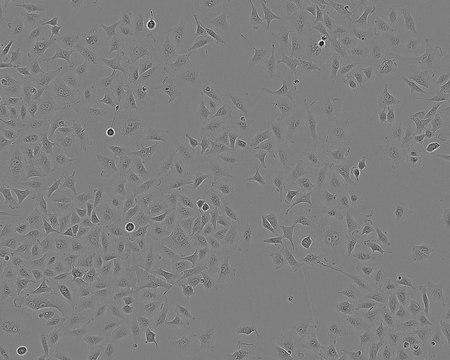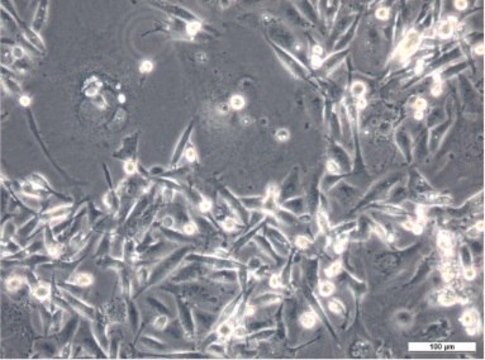PC-3 Cell Line human
Caucasian prostate adenocarcinoma, 90112714
Synonym(s):
PC.3 Cells, PC3 Cells
Sign Into View Organizational & Contract Pricing
All Photos(1)
About This Item
UNSPSC Code:
41106514
eCl@ss:
32190102
Recommended Products
biological source
human prostate
growth mode
Adherent
karyotype
2n = 46, triploid, modal no. 62
morphology
Epithelial
products
Not specified
receptors
Not specified
technique(s)
cell culture | mammalian: suitable
relevant disease(s)
cancer
shipped in
dry ice
storage temp.
−196°C
Related Categories
Cell Line Origin
Human Caucasian prostate adenocarcinoma
Cell Line Description
Established from a grade 4 prostatic adenocarcinoma from a 62 year old male Caucasian. The cells grow in agar and produce tumours in nude mice. Exhibit low acid phosphatase and testosterone-5-α reductase activity. The Y chromosome could not be detected in this cell line by short tandem repeat (STR)-PCR analysis when tested at ECACC. It is a known phenomenon that due to the increased genetic instability of cancer cell lines the Y chromosome can be rearranged or lost resulting in lack of detection. The cell line is identical to the source provided by the depositor based on the STR-PCR analysis.
Application
PC-3 cell line has been used to study the antiproliferative effects of F. mughlea Pesmen on cancer cells. It has also been used to study the effects of palmitoylcarnitine (palcar) on the gene expression and pro-inflammatory pathways in prostate cancer.
Tumourigenicity studies
DNA Profile
STR-PCR Data: Amelogenin: X
CSF1PO: 11
D13S317: 11
D16S539: 11
D5S818: 13
D7S820: 8,11
THO1: 6,7
TPOX: 8,9
vWA: 17
CSF1PO: 11
D13S317: 11
D16S539: 11
D5S818: 13
D7S820: 8,11
THO1: 6,7
TPOX: 8,9
vWA: 17
Culture Medium
Coons Modified Ham’s F12 + 2mM Glutamine + 7% Foetal Bovine Serum (FBS).OR Kaign’s modified Ham’s F12 + 45mg/L ascorbic acid + 18 mg/L Inositol + 2mM Glutamine + 7% Foetal Bovine Serum (FBS).
Subculture Routine
Split sub-confluent cultures (70-80%) 1:2 to 1:6 i.e. seeding at 2-5x10,000 cells/cm2 using 0.25% trypsin/EDTA; 5% CO2; 37°C. Medium change every 5 days. The initial subculture interval after cells are thawed may be longer than 7-9 days.
Other Notes
Additional freight & handling charges may be applicable for Asia-Pacific shipments. Please check with your local Customer Service representative for more information.
Certificates of Analysis (COA)
Search for Certificates of Analysis (COA) by entering the products Lot/Batch Number. Lot and Batch Numbers can be found on a product’s label following the words ‘Lot’ or ‘Batch’.
Already Own This Product?
Find documentation for the products that you have recently purchased in the Document Library.
Our team of scientists has experience in all areas of research including Life Science, Material Science, Chemical Synthesis, Chromatography, Analytical and many others.
Contact Technical Service

